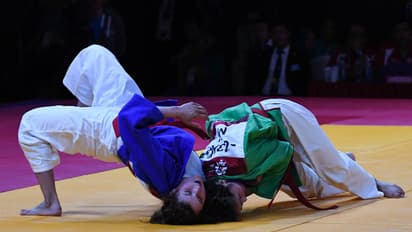
Jakarta: Kurash made its debut at Asian Games 2018 in Indonesia and India’s Pincky Balhara, Malaprabha Yallappa Jadhav scripted history by winning silver and bronze respectively.
India sent 12 athletes to compete in kurash. Pincky and Malaprabha excelled in the women’s 52kg category to finish on the podium.
Since many would not be aware of the sport kurash, here we explain what it is all about.
Kurash is a form of folk wrestling, which originated in Uzbekistan and has a history of 3,500 years. The sport is governed by the International Kurash Association, which was established in 1998. September 6 is the day when kurash was officially initiated.
In each competition, the athlete wears a green jacket and his opponent, a blue jacket. If one of the two athletes makes his opponent fall on his back, he will not receive points. Points are counted only when he makes his opponent fall on either side.
In case a player catches the hip or the waist of his opponent, he will earn points, but those points will not make much of a difference. The referee has the right to pause the competition and restart it if one of the two players touches the ground with his knees or falls down.
Kurash was introduced at the Asian Indoor Games in 2007. In March this year, India hosted the 10th Senior Asian Kurash Championship in Pune.
In 1991, when Uzbekistan became an independent nation, the first president of the country, Islam Karimov, was instrumental in promoting kurash across the globe as a new international sport.
Several kurash competitions were held in Uzbekistan. In September 1998, the capital of Uzbekistan, Tashkent hosted the first-ever international kurash tournament. Players from almost 30 countries of Asia, Europe and the Americas participated. Usually kurash events in Uzbekistan are held at the football stadia.
There are three methods to score points and win
Khalol (pure victory)
A player who scores a khalol wins the bout. The arbitrator announces the appraisal if the throw on back is done by a beautiful and accurate motion.
Yonbosh
It is a half of khalol. Two yonbosh constitute a khalol. When a player makes a throw by a strong, sharp, beautiful motion and the opponent falls on his/her side.
Chala
This is different from the above two. This is the smallest point. No matter how many chalas a player scores, it is not equal to yonbosh or khalol. If a player throws the opponent on his thigh, buttocks, belly or side, but without serious technical errors, he wins a chala.
Penalties
Tanbekh
Tanbekh is announced to the participant who makes minor violations like
1. Running away in purpose, not letting the opponent catch him/her
2. The player pushes the opponent out of gilam (fight area) in purpose or himself/herself runs beyond the dangerous zone of the gilam
3. The wrestler disorders in purpose his/her clothes (unties or reties his/her belt, trousers without the sanction of the arbitrator)
4. The wrestler grips the opponent’s trousers or legs
5. After a grip, the wrestler does not make attacking actions during the 10-15 seconds.
Dakki
Dakki is announced to the participant who has already received a Tanbekh caution, or who makes a medium violation like
1. Repeated intentional falls on knees
2. Not following the arbitrator’s commands, talking or crying out obscene expressions
Girrom
Girrom is announced to the participant, who has already received a Dakin caution, or makes a serious violation like
1. Obscene crying or gesturing during the fight, offensive to opponent and referees
2. If a wrestler is injured by fault of the opponent, he/she receives a Khalol appraisal and the opponent receives a Girrom caution.
Times of bouts
1. Males
From 4 to 11 years — 2 minutes of pure time
From 11 to 16 years — 3 minutes
From 16 to 35 years — 4 minutes
From 35 to 56 years — 3 minutes
From 56 years and above — 2 minutes
2. Females
From 4 to 16 years — 2 minutes
From 16 to 35 years — 3 minutes
From 35 years and above — 2 minutes
(With inputs from official websites of Kurash Confederation Asia-Oceania and Olympic Council of Asia)